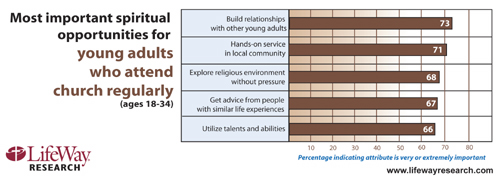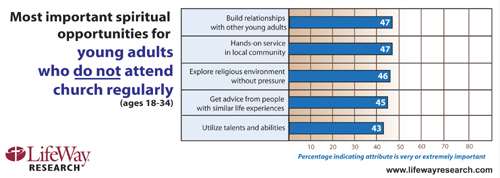The most recent study by LifeWay Research reveals young adults are falling away from church and many are finding church irrelevant to their lives.

The need to reach people ages 18 to 34 can be seen by simply comparing the following statistics: In 1980, more than 100,000 young adults were baptized in Southern Baptist churches. In 2005, slightly more than 60,000 young adults were baptized in SBC churches – a number drastically lower since the United States population had climbed above 300 million.
What’s the problem? Why are young adults not finding church relevant for their lives? LifeWay Research, a department of LifeWay Christian Resources, sought to find answers by conducting an eight-month research project which included interviews with unchurched adults 18 to 34 years of age, regular church attendees and church leaders across the U.S.
Churchgoers or not, the study results indicate young adults are nonetheless longing for community and fellowship with peers, looking for ways to reach people in need and circling the church but not always finding a home in it.
Connection is key
Seventy-three percent of church members and 47 percent of non-affiliated young adults indicated that community with other young adults is extremely important in their lives.
The lack of opportunity for connection within the church proves to be a frustration point for young adults. One study participant said, “After graduation, they give you a pat on the back and say, ‘When you start a family, we’ll be here for you.'”
“The church’s responsibility is to reach every generation with the love of Jesus Christ,” said Jim Johnston, director of young adult ministry at LifeWay Christian Resources. “It just so happens that this generation’s biggest need is relationship. The church ought to be the author and purveyor of the best, deepest, most loving friendships around.”
Seeking authentic answers
The second most important thing for young adult churchgoers is participation in small-group meetings to discuss life application of scripture (71 percent). And both churchgoers and those not affiliated said they desired to participate in Bible study that minimizes finding pat answers in the exploration of scripture.

“The lost and the saved in this age group are looking for just what the church can provide in biblical community,” Johnston said. “They want absolute truth, but they embrace the struggle of finding it themselves. They don’t want it to be spoon-fed to them.”
One study respondent indicated it’s not always about one person with all the answers, but there is value in the combined knowledge and experiences of others. Another study participant put the importance of small-group meetings this way, “What draws people is a climate of honesty. We don’t come and say we’re going to hide from each other – and give Sunday school answers.”
The small-group atmosphere is also where this generation can find “advice from individuals with similar experiences,” the respondent said, which is one of the top five most important things to both churched and unchurched young adults, with 68 percent and 45 percent, respectively, saying it’s very important.
Making a difference is essential
Another high-ranking priority of today’s young adult population is the opportunity to meet the needs of others (social action) on a regular basis. Sixty-six percent of churchgoers rated this as extremely important in their lives, and 47 percent of non-churchgoers said the same.
The study indicates that social action is a big entryway to the church for young adults. In fact, it is cited as the major reason unchurched young adults would consider being part of a church.
“Young adults gravitate to churches that are making an impact,” Johnston said. “This age group is embracing service, social action and missions. They will embrace the church with a cause as well.”
The next step
After seeing several churches that are effectively reaching this generation, Johnston believes there is a bright future for young adults.
“I truly believe this generation wants to embrace Jesus Christ and his plan for their lives,” Johnston said. “They want to embrace church, but only the genuine, earth-shaking, Christ-powered New Testament church. For some churches, that’s going to mean changing methodology – but not the message of the Bible.”
Johnston says it’s simple: Give this generation the unbridled truth of the gospel, without apology, and they will actively embrace it.
If more churches catch on and seek ways to reach young adults, he believes something powerful will surely happen.
“I firmly believe God is orchestrating a movement of his people in this age group,” Johnston said. “This research should give us a great leap forward toward understanding what God is calling us to do to reach this generation.”